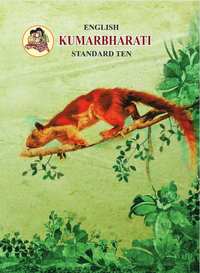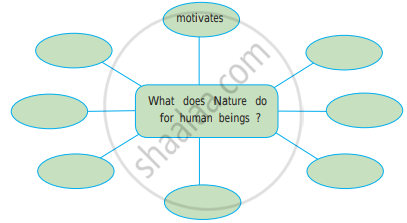Advertisements
Chapters
1.2: The Thief’s Story
1.3: On Wings of Courage
1.4: All the World’s a Stage
1.5: Joan of Arc
▶ 1.6: The Alchemy of Nature
2.1: Animals
2.2: Three Questions
2.3: Connecting the Dots
2.4: The Pulley
2.5: Let’s March
2.6: Science and Spirituality
3.1: Night of the Scorpion
3.2: The Night I Met Einstein
3.3: Stephen Hawking
3.4: The Will to Win
3.5: Unbeatable Super Mom-Mary Kom
3.6: The Concert
4.1: A Thing of Beauty is a Joy For Ever
4.2: The Luncheon
4.3: World Heritage
4.4: The Height of the Ridiculous
4.5: The Old Man and The Sea: Book Review
4.6: The Gift of the Magi

Advertisements
Solutions for Chapter 1.6: The Alchemy of Nature
Below listed, you can find solutions for Chapter 1.6 of Maharashtra State Board Balbharati for English - Kumarbharati 10 Standard SSC Maharashtra State Board.
Balbharati solutions for English - Kumarbharati 10 Standard SSC Maharashtra State Board 1.6 The Alchemy of Nature Warming Up! [Page 37]
Rearrange the good qualities in each set, so that the first letter of each of the words should make a meaningful word. Join the sets and get a message.
Set 1: Understanding/Adaptable/Tolerant/Neat/ Encouraging Resourceful.
- The word is _____________
Set 2: Selfless/Inspiring
- The word is ____________
Set 3: Youthful/Modest
- The word is ___________
Set 4: Affectionate/Compassionate/Empathetic/ Earnest/Honest/Reliable/Trustworthy
- The word is _____________
- The message is _______________
Various aspects of Nature have special features that make them differ from one another.
For example, Birds:- appearance, shape, colour, size, food habits, habitat, sound etc.
Write such special features of each of the following.
- Land- _______________
- Water- ______________
- Trees- _______________
- Animals- ____________
- Insects- _____________
Make a list of living creatures in the alphabetical order. You can write more than one beginning with the same letter.
Balbharati solutions for English - Kumarbharati 10 Standard SSC Maharashtra State Board 1.6 The Alchemy of Nature English workshop [Pages 40 - 43]
What things in nature teach us the following:
Nothing is impossible to achieve ____________.
What things in nature teach us the following:
Problems are not permanent ___________.
What things in nature teach us the following:
Be humble and adjust ______.
What things in nature teach us the following:
Make the best use of time and opportunity__________.
What things in nature teach us the following:
Be persistent ____________.
What things in nature teach us the following:
Many hands make work light ____________.
What things in nature teach us the following:
Delicate structures are not a sign of weakness ______.
Read the question from the lesson. What do they imply?
Are you listening?
Read the question from the lesson. What do they imply?
What if we too had lived our lives, however short, to the fullest?
Read the question from the lesson. What do they imply?
What if we too are consistent, organized, focused...?
Go through the lesson again and complete the flow-chart that highlights the life of a ‘hibiscus’ flower.

Fill the web

The writer explains the contrasting features of ‘water’ and ‘rock’ in the lesson. Write all the features of both water and rock in the given table.
| Water | Rock |
| 1. | 1. |
| 2. | 2. |
| 3. | 3. |
| 4. | 4. |
The writer bas very positively described the different things in nature. Discuss with your partner the special features of coach one of them. Add on the list.
| Part of Nature | Special feature | Value learnt |
| 1. Rainbow | ||
| 2. Caterpillar | ||
| 3. | ||
| 4. | ||
| 5. | ||
| 6. | ||
| 7. |
Think and answer in your own words.
How should you deal with difficulties and problems?
Think and answer in your own words.
‘An oyster turns a grain of sand into a pearl.’ What can we learn from this example?
Think and answer in your own words.
How does nature succeed in its ‘Alchemy’? What can it turn a small person into?
Think and answer in your own words.
Which two aspects of nature teach us to accept change and adjust according to the situation?
Think and answer in your own words.
Why does the writer begin by quoting the lines from William Blake's poem 'Auguries of Innocence'?
Pick out from lesson 10 examples.
- Concrete Nouns (that you can touch or see)
For example, sand
Pick out from lesson 10 examples.
- Abstract Nouns (that which you cannot touch or see
For example, infinity
Underline the verbs in the sentence and say whether it is Transitive (needing an Object) or Intransitive (need not have an Object).
One can witness and experience the beauty of Heaven
Underline the verbs in the sentence and say whether it is Transitive (needing an Object) or Intransitive (need not have an Object).
It leaves me in complete awe.
Underline the verbs in the sentence and say whether it is Transitive (needing an Object) or Intransitive (need not have an Object).
Nature soothes and nurtures.
Underline the verbs in the sentence and say whether it is Transitive (needing an Object) or Intransitive (need not have an Object).
It withers completely.
Underline the verbs in the sentence and say whether it is Transitive (needing an Object) or Intransitive (need not have an Object).
The flower comes to life only for a day.
Underline the verbs in the sentence and say whether it is Transitive (needing an Object) or Intransitive (need not have an Object).
A rainbow colours the entire sky.
Underline the verbs in the sentence and say whether it is Transitive (needing an Object) or Intransitive (need not have an Object).
It smiles and dances
Compose about 8-10 sets of imaginary dialogue between a bird, a tree and its fruit regarding the effects of environmental changes. Write it in your notebooks.
Prepare a Fact file of any of the following plants/trees, using the points given.
[coconut / neem / basil / cactus / apple]
- Name of Plant/Tree _________
- Scientific name ___________
- Region and climate ___________
- Features ___________
- Growth _____________
- Size, shape and colour ____________
- Uses __________
- Any special feature ________
'Impossible' itself says 'I M possible'. Do you agree? Justify your answer by citing something that you have experienced or heard from someone.
You have an environment protection week celebration in your school. You have invited an environmentalist. Your friend interviews him/her about how to save the environment. Frame suitable Interview Questions
Write a News Report on the ‘Environment Day’ celebrated in your school.
Just For Laughs! Enjoy!
Divide the class into two groups. On 12 to 15 slips of paper, Group A writes 12 to 15 conditional clauses beginning with ‘If’.
(For example, If I work very hard, )
Group B writes 12 to 15 main clauses.)
(For example, I would/shall have a pizza.)
Now, one student from Group ‘A’ reads the first conditional clause (possibility) and one student from Group ‘B’ reads the first main clause. It forms crazy sentences, just for laughter and fun. ENJOY!
Solutions for 1.6: The Alchemy of Nature

Balbharati solutions for English - Kumarbharati 10 Standard SSC Maharashtra State Board chapter 1.6 - The Alchemy of Nature
Shaalaa.com has the Maharashtra State Board Mathematics English - Kumarbharati 10 Standard SSC Maharashtra State Board Maharashtra State Board solutions in a manner that help students grasp basic concepts better and faster. The detailed, step-by-step solutions will help you understand the concepts better and clarify any confusion. Balbharati solutions for Mathematics English - Kumarbharati 10 Standard SSC Maharashtra State Board Maharashtra State Board 1.6 (The Alchemy of Nature) include all questions with answers and detailed explanations. This will clear students' doubts about questions and improve their application skills while preparing for board exams.
Further, we at Shaalaa.com provide such solutions so students can prepare for written exams. Balbharati textbook solutions can be a core help for self-study and provide excellent self-help guidance for students.
Concepts covered in English - Kumarbharati 10 Standard SSC Maharashtra State Board chapter 1.6 The Alchemy of Nature are Grammar, The Alphabet, Parts of Speech, Noun, Pronoun, Root Word, Prefix-suffix, Compound Words, Word Building, Punctuation, Speech, Pronunciation, Figures of Speech, Idioms and Phrases, Syllables, Tense, English Translation, Rhyme Scheme, Modal Auxiliary, Use ‘Not Only but Also’, Use ‘As Soon As’, ‘either ... or’ and ‘No Sooner ... Than’, Rhyming Words, Wh-questions, Add a Question Tag, Change the Voice, Make a Sentence, Use of Though, Although, Even Though and but, Spotting Errors, Verb, Adjective, Adverb, Preposition, Conjunction, Interjection, Determiners, Articles - A, An, The, Degrees of Comparison, Make a Sentence, Types of Sentences, Types of Sentences, Subject and Predicate, Direct-Indirect Speech, Clauses, Vocabulary, Synonyms, Antonyms, Homonyms, Homophones, Homographs, Register, Writing Skills, Speech Writing, Story Writing, Summary Writing, Dialogue Writing, Interview Questions, Report Writing, Note Making, Letter Writing, Notice Writing, View and Counterview, Tourist Leaflet, Article Writing, Information Transfer, Expansion of Ideas, Narration, Paragraph Writing, Reading Skills, Unseen Passage Comprehension, Unseen Poem Comprehension, The Alchemy of Nature.
Using Balbharati English - Kumarbharati 10 Standard SSC Maharashtra State Board solutions The Alchemy of Nature exercise by students is an easy way to prepare for the exams, as they involve solutions arranged chapter-wise and also page-wise. The questions involved in Balbharati Solutions are essential questions that can be asked in the final exam. Maximum Maharashtra State Board English - Kumarbharati 10 Standard SSC Maharashtra State Board students prefer Balbharati Textbook Solutions to score more in exams.
Get the free view of Chapter 1.6, The Alchemy of Nature English - Kumarbharati 10 Standard SSC Maharashtra State Board additional questions for Mathematics English - Kumarbharati 10 Standard SSC Maharashtra State Board Maharashtra State Board, and you can use Shaalaa.com to keep it handy for your exam preparation.
